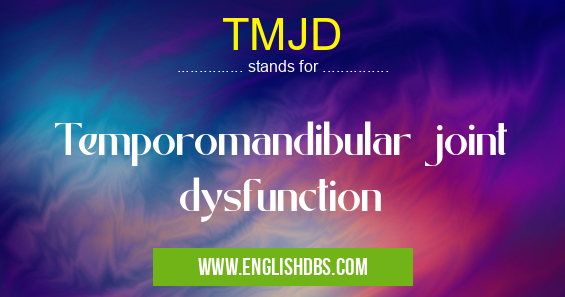What does TMJD mean in CLINICAL MEDICINE
Temporomandibular joint dysfunction (TMJD) is a condition that affects the joint that connects the jawbone to the skull and controls jaw movement. TMJD can cause pain, clicking, popping, or locking of the jaw, as well as difficulty chewing or opening the mouth wide.

TMJD meaning in Clinical Medicine in Medical
TMJD mostly used in an acronym Clinical Medicine in Category Medical that means Temporomandibular joint dysfunction
Shorthand: TMJD,
Full Form: Temporomandibular joint dysfunction
For more information of "Temporomandibular joint dysfunction", see the section below.
Essential Questions and Answers on Temporomandibular joint dysfunction in "MEDICAL»CLINICAL"
What is TMJD?
What causes TMJD?
The causes of TMJD are not fully understood, but it is believed to be caused by a combination of factors, including:
- Muscle tension in the jaw
- Misalignment of the jaw
- Arthritis in the jaw joint
- Injury to the jaw
- Stress
What are the symptoms of TMJD?
The symptoms of TMJD can vary from person to person, but common symptoms include:
- Pain in the jaw, face, or neck
- Clicking, popping, or locking of the jaw
- Difficulty chewing or opening the mouth wide
- Headaches
- Earaches
- Dizziness
How is TMJD diagnosed?
TMJD is diagnosed based on a physical examination of the jaw and a discussion of the patient's symptoms. The doctor may also order imaging tests, such as an X-ray or MRI, to rule out other conditions.
What are the treatment options for TMJD?
The treatment for TMJD depends on the severity of the condition and the patient's individual needs. Treatment options may include:
- Self-care measures, such as applying ice packs, using over-the-counter pain relievers, and practicing jaw exercises
- Physical therapy to improve jaw function and range of motion
- Medications to relieve pain and inflammation
- Dental treatment to correct misalignment of the jaw
- Surgery in severe cases
What is the prognosis for TMJD?
The prognosis for TMJD varies depending on the severity of the condition and the patient's response to treatment. Most people with TMJD can manage their symptoms with self-care measures and physical therapy. However, in some cases, TMJD can be a chronic condition that requires ongoing treatment.
TMJD also stands for: |
|
| All stands for TMJD |
